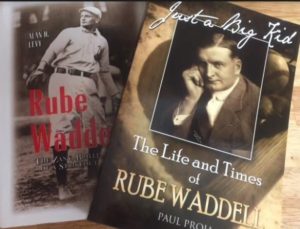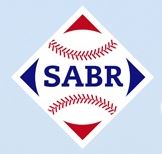This post was triggered by yesterday’s (August 18) complete-game, 3-1 victory over the Phillies – logged by the Mets’ Jacob deGrom. It was, as reported, his first complete game of 2018 and the third complete outing of his career. He also lowered his earned run average to an MLB-best (among qualifiers) 1.71. The outing made deGrom just the 29th pitcher to toss a complete game this season, with the five pitchers sharing the MLB lead with two 2018 complete games.
It led me to reflect on one of my favorite ballplayers of all time – Rube Waddell – who put up three seasons with earned run averages under 2.00 of his own. Please note that this post is not a criticism of today’s game (and the heavy use of relievers), but rather just an opportunity to share a look at one of MLB’s past “characters.” (No, I’m not only enough to have seen him play, just going on reputation.)
 On this date (August 19) in 1900, Rube Waddell took the mound for manager Connie Mack’s Milwaukee Brewers of the (then minor league) American League in the first game of a Sunday doubleheader. (Note: The American League was designated a major league in 1901.) Waddell was facing Charles Comiskey’s Chicago White Stockings – embroiled in a tough race with the Brewers for the American League championship.
On this date (August 19) in 1900, Rube Waddell took the mound for manager Connie Mack’s Milwaukee Brewers of the (then minor league) American League in the first game of a Sunday doubleheader. (Note: The American League was designated a major league in 1901.) Waddell was facing Charles Comiskey’s Chicago White Stockings – embroiled in a tough race with the Brewers for the American League championship.
Let’s set the stage. On the previous Sunday (August 12), Waddell had tossed a twelve-inning complete game, giving up just one run as Milwaukee topped Kansas City. Four days later, he again went 12-innings – in a game against the White Sox that ended in a 1-1 tie. Facing the White Sox again on August 19, Waddell went 17 innings in a 2-1 victory in the first game of a twin bill. Manager Connie Mack knew Game Two was critical to the pennant race and so he asked Waddell if he could pitch the second contest as well – promising him three days off to go fishing if he took on the task (knowing time off to play was the way to Waddell’s heart, head … and arm). Waddell agreed to the deal and picked up a 1-0, one-hit win over Chicago – in a game shortened to five innings so that the Brewers could catch a train.
So, basically, Waddell threw four complete games (three of them extra innings) and 46 innings in eight days – including 22 innings in winning both ends of that August 19 doubleheader. Waddell finished the 1900 season with Pittsburgh of the National League, where he went 8-13, despite an NL-low 2.37 earned run average.
Rube Waddell is almost universally recognized as the zaniest player in MLB history – but he also was one of the best (when he was focused on the game). Waddell was known to: leave a ball game to chase fire engines; miss a game he was scheduled to start because he was fishing or playing marbles with neighborhood kids; bring his outfielders in to sit on the grass and then proceed to fan the side (only in exhibition games of course); wrestle alligators in the off-season; enjoy more than an occasional libation; and (frequently) do battle with owners and managers. Waddell simply was more interested in enjoying life in his own way than in money or professional stability.
Still, when Waddell set his mind and his heart to it, he could be something pretty special on the mound. Thanks to his unpredictability, however, his professional career included stints with five major league clubs (13 seasons) and numerous minor league, independent, semi-pro and barn-storming teams. For BBRT’s Minnesota readers, Waddell was a 20-game winner for the 1911 American Association champion Minneapolis Millers.
Rube Waddell was born on Friday the 13 of October in 1876 and died on April Fools day 1914. There is some symmetry there.
How good was Rube Waddell? In 1902, he joined the Philadelphia Athletics in June – making his first start on June 26 (with just 86 games left in the season). Waddell proceeded to win 24 games (the league’s second-highest total) against seven losses, with a 2.05 ERA. Despite his shortened season, he led the AL with 210 strikeouts, fifty more than the runner-up (none other than Cy Young). The 6’1”, 195-lb. lefty (fugures Waddell would be a southpaw) went on to lead the AL in strikeouts six consecutive seasons (1902-1907) – by a wide margin. (Note: The Athletics, just two games over the .500 mark when they signed Waddell, finished at 83-53 and won their first American League pennant.)
In 1904, Waddell set a modern (post-1900) MLB record with 349 strikeouts that stood until 1965 (when Sandy Koufax fanned 382). The next highest total in 1904 went to the Giants’ Jack Chesbro, a full 110 whiffs behind Waddell – despite pitching 71 2/3 more innings. That season, Waddell average 8.2 strikeouts per nine innings, at a time when the league average was 3.8.
Waddell, elected to the National Baseball Hall of Fame in 1946, finished with a 193-143, 2.16 stat line. In the four seasons from 1902-1905, pitching for the Philadelphia Athletics, Waddell went 97-52, with a 1.88 earned run average and 1,148 strikeouts (versus 330 walks). In those four peak campaigns, he threw 1,312 innings (an average of 328 innings per season), completed 126 of 145 starts and twirled 22 shutouts.
For more on Waddell, BBRT suggests: “Rube Waddell: The Zany, Brilliant Life of a Strikeout Artist,” by Allan Howard Levy and “Just a Big Kid: The Life and Times of Rube Waddell,” by Paul Proia. They are both good reads.
Primary Resources: Society for American Baseball Research; Baseball-Reference.com; and the above-mentioned books.
I tweet baseball @DavidBBRT
Follow/Like the Baseball Roundtable Facebook page here.
Member: Society for American Baseball Research; The Baseball Reliquary; The Negro Leagues Baseball Museum.





